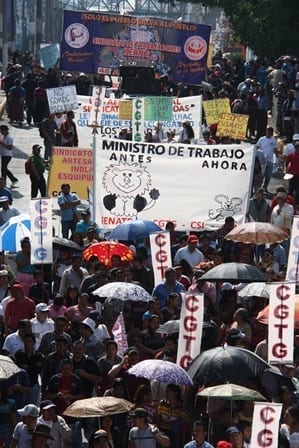May 17, 2013

Workers rally for justice for murdered trade unionists during May Day events in Guatemala City. Credit: Stephen Wishart
Worker rights groups are urging the Guatemalan government to bring justice to the families of the more than 56 trade union leaders killed in the past three years. No one has ever been convicted in Guatemala for killing a union leader.
The Trade Union Confederation of the Americas (TUCA) has written to President Otto Perez Molina asking for action to resolve the murders of union leaders and for a commitment to guarantee the right to freedom of association and collective bargaining. TUCA, the regional structure of the International Trade Union Confederation (ITUC), represents more than 50 million workers.
In the letter, TUCA states the murders and the numerous acts of torture, kidnappings, raids and death threats have created a culture of fear and violence throughout the country accompanied by an unrelenting series of violations of freedom of association and the right to collective bargaining.
TUCA also writes that the global trade union movement was surprised by the 2013 Report by the International Labor Organization Committee of Experts which cited the government’s progress in resolving numerous cases.
“While progress was reported in these cases, the report fails to share information on concrete results or sentences in a single case. Of most concern is that of the 58 killings admitted by the government over the last six years, only in two cases has the government declared trade union activities as the motive. The other deaths are included among the so-called common crimes such as ‘extortion,’ ‘personal differences’ or ‘crimes of passion.’”
Over the past 20 years, the international community has appealed to the Guatemalan government to address serious human rights violations, to little effect. In addition, Guatemalan unions have sent detailed recommendations for improved labor rights compliance to its government, filed under the Dominican Republic-Central American Free Trade Agreement (DR-CAFTA) complaint process. In 2008, six Guatemalan trade unions filed a complaint about the suppression of worker rights under the trade agreement. The case advanced to the dispute resolution phase in 2011 and is still pending.
TUCA writes that the Rios Montt verdict, “achieved through a profound mobilization of Guatemalan civil society, must now be consolidated, and extended to all sectors of society who suffer the weight decades of violence and impunity. The labor movement, in particular, continues to be one of the main targets of this repression.”
Feb 1, 2013

A Guatemalan banana worker.
Since 2007, 64 trade unionists have been murdered in Guatemala, and hundreds more union leaders and members have been kidnapped, tortured and threatened with death—all part of an ongoing pattern of violations against worker rights, according to Britain’s Trade Union Congress (TUC). Only a small fraction of these incidents have been investigated, and 98 percent of these crimes have not been punished.
Over the past 20 years, the international community has appealed to the Guatemalan government to address serious human rights violations, to little effect. The TUC now is adding its voice in urging the International Labor Organization (ILO) governing board to establish a special inquiry commission—its highest investigative body—to push for needed reforms. Last June, 10 worker delegates to the ILO’s Labor Conference, from Asia, Africa, Europe, and the Americas, filed a request with the ILO for such a commission.
Guatemalan unions have sent detailed recommendations for improved labor rights compliance to its government, filed under the Dominican Republic-Central American Free Trade Agreement (DR-CAFTA) complaint process. In 2008, six Guatemalan trade unions filed a complaint about the suppression of worker rights under the trade agreement. The case advanced to the disputeresolution phase in 2011 and is still pending.
Members of Guatemala’s Union of Izabal Banana Workers (SITRABI) are particularly threatened. In 2011, four of the 10 trade unionists murdered in Guatemala were from SITRABI, a long-time Solidarity Center partner, and the murder of SITRABI members continued into 2012. The International Trade Union Confederation (ITUC) 2012 Survey of Trade Union Rights described Guatemala as “characterized predominantly by human rights violations,” as the “right to life of trade union, rural and indigenous community leaders and human rights defenders continued to be violated.”
Meanwhile, the Guatemalan government has for several decades supported the maquila (light manufacturing) industry through tax holidays and the failure to enforce its labor laws. Any company exporting more than 51 percent of production can be classified as a maquila and so qualify for significant tax breaks. Although the law requires businesses to respect labor law to receive tax breaks, employers are rarely penalized for retaliating against workers who seek to form unions, even though employer tactics include targeted or mass firings, death threats, blacklists or plant closings (and sometimes reopening elsewhere under a new name).
For example, at the Ternium aluminum processing plant in Villa Nueva, Emeterio Nach was among workers fired in recent months after seeking to form a union. “Management used to tell us they can do whatever they want with the workers,” said Nach, speaking through a translator. “They didn’t care about the Ministry of Labor or inspections or anything. I could never take a day off.”
Nach’s experience is all-too common for Guatemalan workers who, when seeking to improve their wages and working conditions, lose their jobs and, sometimes, their livees.
Oct 11, 2012
When Emeterio Nach suffered a shoulder injury at his job, he asked his supervisor at the Ternium aluminum processing plant in Villa Nueva, Guatemala, for time off to see his doctor. After the supervisor denied his request, Nach asked again. The supervisor continued to refuse, finally telling Nach he would be fired if he kept asking—and would be fired if he were sick because the factory needed healthy workers.
The 250 workers at the Villa Nueva plant frequently experienced such treatment, leading Hernández, along with his co-workers, to create a union, SITRATERNIUM (Ternium International Guatemala Worker’s Union). They filed for registration of organization in March with the Ministry of Labor.
As a result, the company immediately fired dozens of workers, including Nach. The firings violate Guatemalan labor code (Article 209) as well as international labor standards relating to freedom of association and the right to unionize.
“Management used to tell us they can do whatever they want with the workers,” said Nach, speaking through a translator. “They didn’t care about the Ministry of Labor or inspections or anything. I could never take a day off.” Nach worked more than four years at the factory, helping produce metal beams, and said if the workers do not put in 12 hours a day, seven days a week on the job, Ternium fires them.
Workers and management met in six mediation sessions in April and May, but the company refused to negotiate. Ternium reinstated 10 of the 27 workers in July, but workers say they have been threatened against speaking of the union to others. One says he was suspended for eight days for speaking to a colleague about the union during his lunch break. Others have been ostracized, isolated and harassed at work.
The Guatemalan Ministry of Labor registered the union in August, granting it legal recognition and enabling the fired workers to seek reinstatement and require Ternium to abide by Guatemala’s labor code. Ternium has asked the court to dismiss the workers’ petition. The case now is tied up in court.
Meanwhile, Nach and other fired workers, like Enrique Arana and Vicente Carias, are taking odd jobs to scrape by—Carias sells ice cream on the street, Arana makes a little money as a barber. All are having trouble paying rent, water and electricity. But it’s the children who are suffering the most, the men say. Children cannot take final exams until their families pay school fees and often cannot finish the school year. They describe with sadness how Walter Ignacio Rodríguez Gómez, who had more than three years on the job at Ternium before he was fired for his union support, had to pull his 8-year-old son out of school. They believe the company has blacklisted them because similar factories will not hire them.
The International Trade Union Confederation (ITUC) recently described Guatemala as among the worst violators of worker rights in the world today. Not only are workers routinely fired for asserting their rights at work, increasingly, they are threatened, tortured or murdered. Six banana workers active in their union were killed over the past year and a half.
As a result of decades of repression, fewer than 2 percent of workers are union members. In June, workers from around the world filed a complaint with the International Labor Organization (ILO) urging Guatemala to respect the right of freedom of association.
Nach says he and his co-workers are “eager and willing to continue with the fight.”
But they need the help of the global union community. Take action now: Write to Paolo Rocca, chairman of Ternium S.A., and demand that his company comply with the Guatemalan Labor Code and international labor practices.
And make sure the workers know you support them—Like SITRATERNIUM at its Facebook page.
The Solidarity Center spoke by telephone with Emeterio Nach, Enrique Arana and Vicente Carias.

Nov 6, 2008
Guatemala’s laws include unreasonable restrictions and requirements on union membership and the right to strike. Women workers are usually paid less than their male counterparts for work of equal value. Indigenous workers and rural workers, with few legal rights, are particular targets of discrimination. Guatemala’s migrant workers—both internal migrants and workers who migrate to work in other countries—suffer some of the worst abuses. Despite these discouraging conditions, Guatemalan workers and their unions are determined to establish justice at the workplace and in their country.
Download here.



